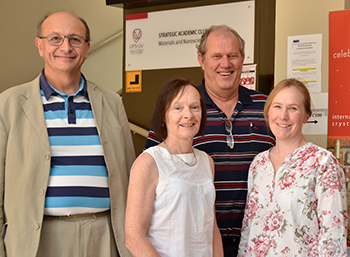Latest News Archive
Please select Category, Year, and then Month to display items
03 October 2018
|
Story UFS
|
Photo Katlego Sekele
 Students engaged authorities and Student Affairs
representatives on sexual and gender-based matters.
Students engaged authorities and Student Affairs
representatives on sexual and gender-based matters.
Do you know enough about the Sexual Harassment, Sexual Misconduct and Sexual Violence policy adopted by the university in June 2018? The Office for Gender and Sexual Equity (GSE) at the University of the Free State (UFS) hosted a dialogue on the role of the institution in matters of sexual and gender-based violence and addressing issues surrounding sexual violations.
Developments such as the countrywide #TotalShutdown: Intersectional Women’s March Against Gender-based Violence last month serve as proof of the dire need for issues surrounding sexual violations to inform policies and active safety measures.
Policy purpose
According to the policy, the objectives are to create a safe and enabling environment, establish a common understanding of what constitutes sexual harassment, sexual misconduct and sexual violence, provide applicable and accurate information, ensure that victims receive the necessary support, clearly outline disciplinary procedures for perpetrators, and clarify institutional accountability.
Student’s take on solutions
Tammy Fray, a member of the Student Representative Council, who formed part of the panel at the discussion, says the policy is not a one-stop-shop solution. “The policy is a guiding document. We have to then use it to inform activist work. We cannot always put the onus on policies and codes of conducts to solve problems. However it is our responsibility within this academic space to come up with solutions that enhance the way the policy works.”
Be informed about the policy
It is important to understand the stipulations of the policy in order to make full use of it. Geraldine Lengau, Officer at the GSE said: “It’s important that students know that the institution is not operating in silos but that their demands have been heard and the institution has acknowledged that there is a need for the policy to be adopted. It also makes the process of reporting better with the assistance of the Sexual Assault Response Team coordinator.”
Prestige Scholar hosts Prof John Helliwell of Manchester University
2015-12-08

From left is Prof John R. Helliwell (School of Chemistry, University of Manchester), Dr Madeleine Helliwell (School of Chemistry, University of Manchester), Prof Andre Roodt (Department of Chemistry, University of the Free State) and Dr Alice Brink (Department of Chemistry, University of the Free State).
Photo: Steven Collett |
At the invitation of Dr Alice Brink of the Department of Chemistry, Prof John Helliwell, the 2015 Max Perutz Prize winner, and his wife, Dr Madeleine Helliwell, visited the University of the Free State (UFS).
The Helliwells, both chemists of note, took part in a series of lectures and exchanges on the Bloemfontein and Qwaqwa Campuses.
This visit from 9-19 November 2015 was the consequence of Dr Brink’s participation in the Vice-Chancellor’s Prestige Scholars Programme (PSP) initiative to encourage the broadening of the international footprint of the next generation of scholars in the academy.
Two year collaboration
Dr Brink and Prof Helliwell from Manchester University have a standing collaboration going back two years. Dr Brink, an NRF Thuthuka grant holder and a member of the PSP since 2013, has spent almost eight months in Manchester, collaborating with Prof Helliwell on her study of the successful interaction of rhenium tricarbonyl complexes with proteins determined via protein crystallography.
Their collaboration resulted from the close association of Prof Helliwell and Prof Andre Roodt from the UFS Department of Chemistry, both former presidents of the European Crystallographic Association.
Sharing academic expertise
Prof Helliwell, the 2014 American Crystallographic Association Patterson Award winner for his “pioneering contributions to the global development of the instrumentation, methods and applications of synchrotron radiation in macromolecular crystallography”, gave three lectures in the Department of Chemistry, two on the Boemfontein Campus, and the other on the Qwaqwa Campus on 13 November 2015.
Dr Helliwell, former co-editor of the Acta Crystallographica Section C: Crystal Structure Communications journal, consulted with postgraduate students from the Departments of Chemistry and Biochemistry.